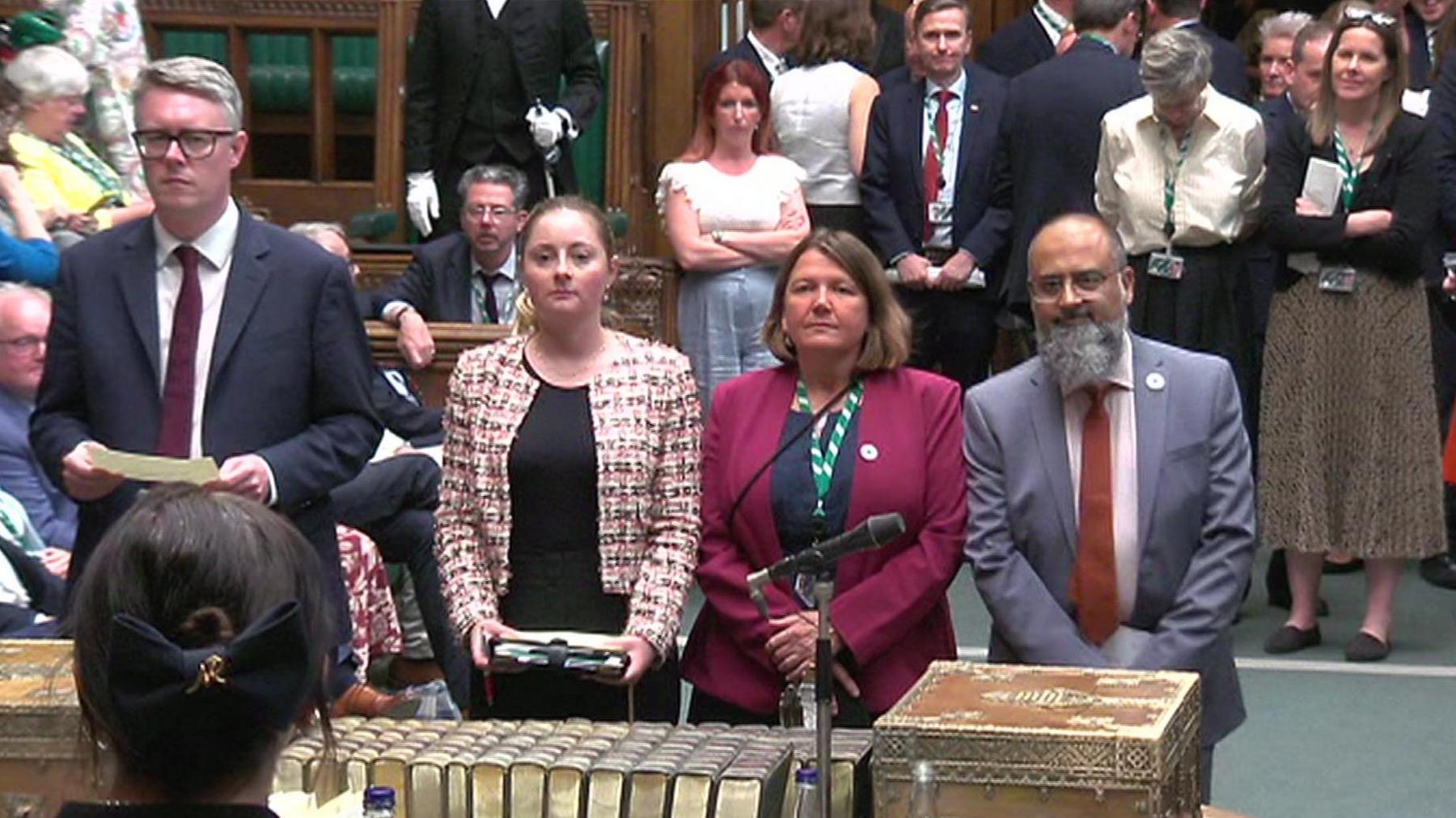Government's watered-down benefits bill clears Commons

- Published
MPs have approved the government's benefits bill, which was heavily watered-down last week following a rebellion by Labour backbenchers.
The Universal Credit Bill is expected to be classed as a money bill, external, meaning it could become law after one month, with or without the approval of the House of Lords.
The measures implement cuts to the health-related element of universal credit for some claimants, while ensuring other parts of the benefit rise above inflation.
The bill had originally proposed making it harder for people to claim the personal independence payment however, following objections from Labour MPs, this has been scrapped for existing claimants and put on hold for future ones.
Personal independence payment (Pip) is paid to people with long-term physical or mental health conditions and is not linked to the recipient's savings or income.
In contrast, universal credit (UC) is means-tested and designed to help support the unemployed or low-paid people.
Urging MPs to back the bill, Disabilities Minister Sir Stephen Timms said: "If you can work, you should, if you need help into work, the government should provide it, and those who can't work must be able to live with dignity.
"Those are the principles underpinning what we're doing."
The government said nearly four million households would see their income boosted by £725 over the next five years, as a result of increasing the universal credit standard allowance.
Despite the government's climbdown last week, 47 Labour MPs still voted against the legislation and backed a rebel amendment tabled by York MP Rachael Maskell.
During a debate ahead of the final votes, Maskell called the bill an "omnishambles" which would result in different levels of UC to people depending on whether they had claimed before or after April 2026.
She asked if someone who came off universal credit as their illness subsided but then had a relapse and needed the benefit would be awarded a lower rate compared to what they had previously received.
Sir Stephen said the bill already protected people in the situation she had described.
However, Maskell pushed her amendment to a vote which would see those with fluctuating medical conditions receive the existing rate of UC, rather than the lower rate applied to new claimants. It was defeated by 334 votes to 149.
The Conservatives also tabled an amendment which would have made further changes including reducing payments for those with less severe mental health conditions and excluding some foreign nationals from certain benefits.
It was defeated by 416 votes to 103. In the final vote, MPs approve the bill by 336 votes votes to 242.
The changes to universal credit will apply across the UK while any measures relating to Pip apply in England, Wales and Northern Ireland.
Liberal Democrat MP Christine Jardine lost her role as the party's Scotland spokesperson after she voted against a Conservative-led amendment to the bill.
A party spokesperson said the official position was to abstain, as "a vote against was effectively a vote to implement this shambolic bill in full".
They added: "Instead Liberal Democrats voted to oppose the welfare Bill altogether. Christine decided to take a different view and therefore is no longer on the front bench."
Eight other Lib Dem MPs joined Jardine in opposing the amendment, but none held senior roles in the party.
Controversial benefits change passes Commons
Last week - in order to ensure the bill could pass - ministers were forced to make last-minute concessions including announcing that stricter eligibility rules for new Pip claimants would not be introduced until a review into Pip assessments had been completed.
The review - which aims to conclude in autumn 2026 - will be led by Disabilities Minister Sir Stephen Timms and would be co-produced with disabled people and the organisations that represent them.
During Wednesday's debate, several Labour MPs urged the government to strengthen the role of disabled people in the review.
Labour MP Marie Tidball said their involvement in the Timms review should be "meaningful and not performative".
Another Labour MP, Stella Creasy, said disabled organisations should have veto power over any recommendations made by the review.
Before MPs had begun their debate, a United Nations panel raised concerns about the impact the government's proposals would have on disabled people.
In a letter to the Department for Work and Pensions, the UN's high commissioner asked about measures to "address the foreseeable risk of increasing poverty rates amongst persons with disabilities if cuts are approved".
The government had estimated the bill would save £5bn a year by 2030, however the concessions it made to ensure the bill could pass mean those savings have been virtually wiped out.
Last week, Chancellor Rachel Reeves was asked if the changes would lead to tax rises. She said she would not "speculate" but added: "Of course there is a cost to the welfare changes that Parliament voted through this week and that will be reflected in the Budget."

Sign up for our Politics Essential newsletter to read top political analysis, gain insight from across the UK and stay up to speed with the big moments. It'll be delivered straight to your inbox every weekday.